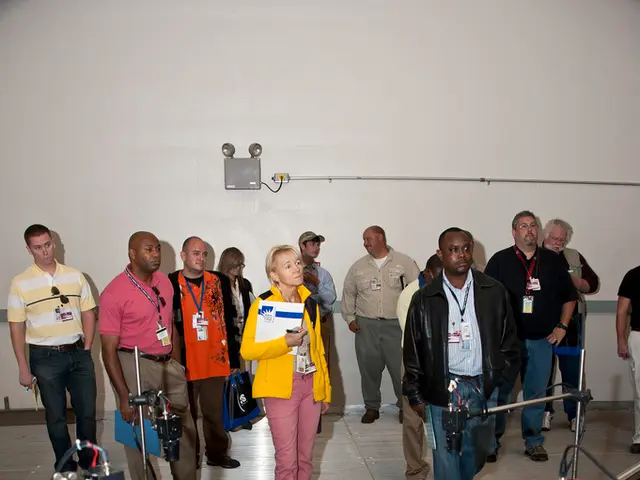Could these three inventions revolutionize your medical routine?
Tech-driven healthcare transforms the patient experience, contributes to long-term health results, and simplifies the delivery of care. Let's see what's hot in 2017! This rundown, based on Medical News Today's report from the recent WIRED Health conference, reveals innovations that could revolutionize patient care.
Focusing on each patient's unique needs is crucial for overcoming prevalent health challenges. From tackling type 2 diabetes to personalized molecular diagnostics for cancer, here are some tech advancements that can make a difference:
Verily's Personalized Solutions:
Cardiologist Dr. Jessica Mega of Verily, formerly Google Life Sciences, emphasized the importance of using technology to create solutions beneficial for providers and patients. Enter Onduo, their new platform developed alongside Sanofi since last September. Initially focusing on the type 2 diabetes community, Onduo promises personalized care through devices, software, and traditional medicine. Key features of the product include improving medication management, health goals, and healthy behavior, with patient, clinician, payer, and other healthcare professional inputs involved in the development. The aim is to eventually extend this platform to type 1 diabetes patients and high-risk groups, aiming to prevent diseases.
A miniaturized continuous glucose monitor (currently in development with Dexcom) is a part of the tech side of this new platform, replacing traditional bulky devices. For those familiar with continuous glucose monitoring, like Randall Barker, who was diagnosed with type 1 diabetes in 1991 and has a daughter with the same condition, multiple meters and inconveniences are part of daily life. Verily is hoping to make continuous monitoring less disruptive by building "miniaturized sensor electronics on an adhesive patch."
Continuous Data, Better Care:
According to a study in Diabetes Therapy, only half of type 2 diabetes patients achieve recommended glycemic goals. Could continuous, accurate data paint a clearer picture of each individual patient, enabling better care? Verily's patch aims to facilitate "subcutaneous monitoring of the interstitial fluid," which could be less burdensome for those required to measure their glucose levels. However, concerns remain, as interstitial fluid readings do not always accurately reflect blood glucose readings, the cost remains high, and the evidence supporting the duration needed for significantly improved outcomes is limited.
Guardant Health's Cancer Conquest:
Helmy Eltoukhy, CEO of Guardant Health, itched to speed up progress in cancer diagnostics. Guardant Health, partnering with oncologists across the US and Korea, presented research in PLOS One showing high analytical accuracy in detecting somatic mutations in circulating tumor DNA from patients with stage III-IV solid tumors using their digital next-generation sequencing platform. The Guardant360 system is designed to identify mutations associated with solid tumors, enabling early detection and response to targeted therapies.
Guardant Health is currently conducting sample collections from multiple trial sites, with data expected soon. They're also part of the ambitious LUNAR project, collecting genomic data from tens of thousands of people with or at high risk of early-stage cancer, aiming to redefine the understanding of disease and arm researchers with tools to create novel therapies.
Sync Project's Music Remedy:
Music therapy isn't new in medicine, but Marko Ahtisaari of Sync Project wants to reinvent it with precision. Partnering with scientists and musicians, the team explores how music can impact heart rate, brain activity, and sleep patterns, developing personalized music therapeutics using machine learning. Speaking about unwind.ai, a project intended to relax listeners before sleep using heart rate as a "musical thermometer," Ahtisaari said they were collecting a broad dataset to inform future soundtrack generation.
These tech advancements could revolutionize healthcare, making it more personalized, accessible, and effective. It's fascinating to witness technology's growing role in health, and we can't wait to see what the future holds!
- Tech-driven healthcare innovations, as showcased by Verily's Onduo platform, prioritize personalized care for patients with chronic diseases like type 2 diabetes, aiming to simplify medication management and improve health outcomes.
- Guardant Health, a company in cancer diagnostics, is using digital next-generation sequencing to detect somatic mutations associated with solid tumors, potentially enabling early detection and targeted therapy response.
- Music therapy, reinvented by Sync Project, is utilizing machine learning to develop personalized music therapeutics that affect heart rate, brain activity, and sleep patterns, with the intent to relax listeners and optimize overall health and wellness.
- The tech industry's impact on healthcare continues to expand, from miniaturized continuous glucose monitors for diabetes patients, to large-scale genomic data collection projects that aim to redefine disease understanding and create novel therapies for several medical conditions.








